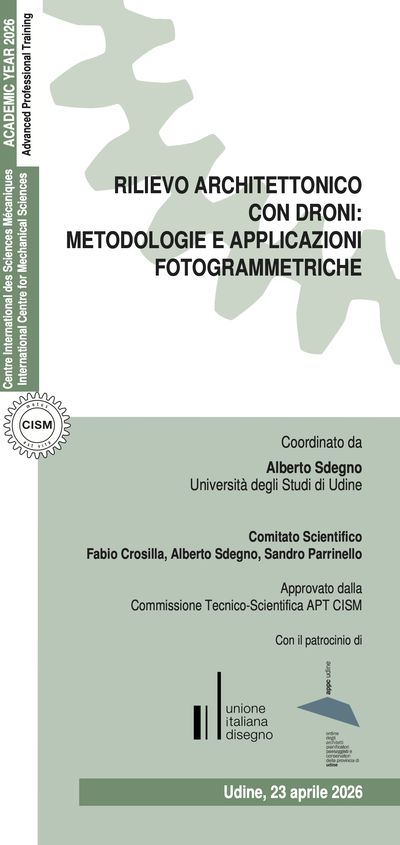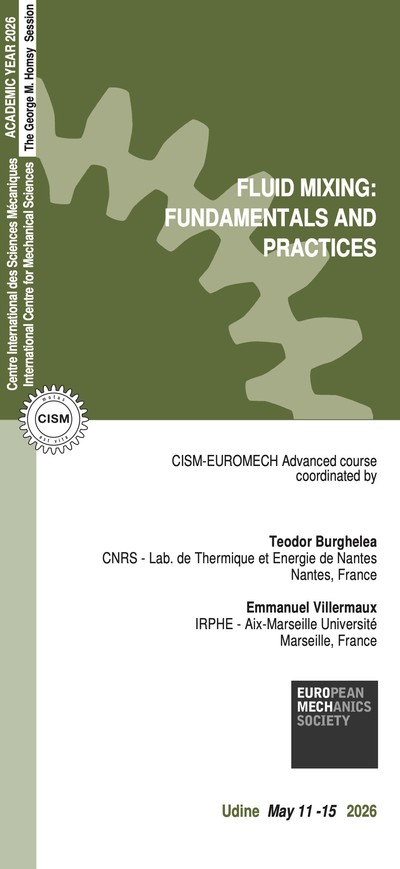Fiber reinforced composites are increasingly being used in the aerospace and automotive industry to cope with lightweighting challenges and meet high performance standards. The manufacturing processes are essential for the quality of the final composite. Simulation of composite manufacturing processes requires experimental analysis and modelling of the transformations involved. These simulations can prevent a time consuming and expensive "trial and error" process design. During the process, the phenomena concern fibrous materials in large deformation and the flow of resin into the fibrous reinforcement. They depend on heat transfer and sometimes phase change. Experimental analysis, modelling and simulation of physical phenomena during composites forming are the objectives of the course. It will concern in particular composite materials for structural parts. The analysis of forming of the reinforcement without resin (dry preform) and with non-hardened resin (prepreg) will be considered as well as thermomechanics and consolidation of the composite during prepreg forming and flow processes in composite materials. This course is aimed at Ph.D. students and Master students in the field of composite engineering. Researchers interested in composite forming are also welcome to attend this course.
The main points to be covered in this course are as follows:
1. Draping of fibrous preforms and prepregs.
Forming of continuous fiber reinforcements leads to specific mechanical problems because of the relative slippage between the fibers and the quasi-inextensibility of the fibers. The following topics are included in this theme:
• Mechanical tests for fibrousreinforcements (shear, biaxial tension, bending, transverse compaction).
• Constitutive law for textile reinforcements (Hyper elasticity, hyper viscoelasticity...)
• Simulations of preform deformation at macro, meso and microscale.
• Specific finite elements, locking of textile materials
• Full field strain measurements (DIC) and Micro CT analyses of internal geometry
• Beyond the classical Cauchy approach. Generalized continuum mechanics.
2. Liquid composite moulding One of the most efficient composite manufacturing method is to impregnate the fiber reinforcement (the preform) by liquid flow of matrix material.
Analysis and simulation of this flow within the fibrous preform constitutes a broad scientific field necessary for modeling of composite manufacturing processes.
• Permeability (measure and virtual)
• Multi-scale flow models
• Saturation
• Investigation by X-ray CT
• Simulation techniques: FE- Control Volume, FE-Level Set, Pure FE
3. Thermo mechanics, Thermo kinetics and Couplings Composite forming processes are carried out at high temperature and the coupling between mechanical and thermal behavior is important. Consolidation and crystallization of the resin are also coupled with the forming deformation
• Multi-scale and multi-physical models and algorithms
• Curing, crystallization, polymerization
• Residual stresses
• Coupling algorithmic
Spencer, A. J. M. (1972). Deformations of fibre-reinforced materials. Oxford University Press.
Coussy, O. (2004). Poromechanics. John Wiley & Sons.
Lomov, S. V., I. Verpoest and F. Robitaille (2005). Manufacturing and internal geometry of textiles. Design and manufacture of textile composites. A. C. Long, Woodhead: 1-60.
Basar, Y., & Weichert, D. (2013). Nonlinear continuum mechanics of solids: fundamental mathematical and physical concepts. Springer Science & Business Media.
Boisse, P. (Ed.). (2011). Composite reinforcements for optimum performance. Elsevier.
Henning, F., Kärger, L., Dörr, D., Schirmaier, F. J., Seuffert, J., and Bernath A.: Fast processing and continuous simulation of automotive structural composite components. Composites Science and Technology, (171):261–279, 2019.
A. Safonov, P. Carlone, I. Akhatov, Mathematical simulation of pultrusion processes: A review, Composite Structures, 184, 2018, 153-17.
Bussetta P., and Correia N.: Numerical forming of continuous fibre reinforced composite material: A review. Composites Part A: Applied Science and Manufacturing, 113:12–31, 2018.
Kärger, L.; Bernath, A.; Fritz, F.; Galkin, S.; Magagnato,D.; Oeckerath, A.; Schön, A.; Henning, F.: Development and validation of a CAE chain for unidirectional fibre reinforced composite components. Composite Structures 132: 350–358, DOI: 10.1016/j. compstruct.2015.05.047, 2015.
Y. Kyosev, Topology-Based Modeling of Textile Structures and Their Joint Assemblies Principles, Algorithms and Limitations, Spinger, 2019, https://www.springer.com/ de/book/9783030025403.
Binetruy, C., Chinesta, F., & Keunings, R. (2015). Flows of Simple Fluids in Complex Microstructures: Composite Processing of Structural Polymer Composites. In Flows in Polymers, Reinforced Polymers and Composites (pp. 109-140). Springer, Cham.
6 lectures on: Liquid Composite Molding processes. Classification according to the main physical phenomena involved. Micro-scale and macro-scale modeling. Some constitutive laws and their characterization. Application to flow in stationary and deformable multi-scale fibrous media.
6 lectures on: Mechanics of textile reinforcement during forming. Hypoelastic and hyperelastic approachs. Specific mechanical characterization tests. Shell approaches for textile preforms. Limits of the mechanics of Cauchy. Second gradient approaches. Simulation of wrinkling during fibrous fabric forming. Thermomechanics and consolidation.
6 lectures on: Pultrusion process. Characterization of resin systems for pultrusion processes. Modeling of reactive resin flow in non-homogeneous advancing porous medium. Modeling of the thermochemical behavior of the material. Stress-strain and pulling force prediction.
6 lectures on: Continuous virtual process chain of CoFRP. Data interfaces, data convention, mapping, interpolation methods. Manufacturing effects and their thermo-chemo-mechanical influences on process and structural behavior. Draping effects, residual stresses, warpage.
6 lectures on: Types of fiber based (textile) structures - woven, braided, warp and weft knitted, combined (multiaxial reinforced, stitched); fleeces (nonwoven). Typical tensile, shear, bending and compression behaviour of the different types. Influences between the structure topology, production parameters and forming influencing parameters.
6 lectures on: Architecture of textile reinforcements (weaving, braiding, NCFs). Geometrical models of unit cells. Deformability of textiles: deformation modes (bending, compaction, shear, biaxial tension, friction), measurement and analytical models.
The course is offered in a hybrid format giving the possibility to attend the course also by remote (on Microsoft Teams platform). On-site places are limited and assigned on first come first served basis.
The registration fees are:
- On-site participation, 600.00 Euro + VAT* * where applicable (bank charges are not included) Italian VAT is 22%.
This fee includes a complimentary bag, five fixed menu buffet lunches, hot beverages, downloadable lecture notes.
Deadline for on-site application is April 2, 2022.
- Online participation, 250.00 Euro + VAT* * where applicable (bank charges are not included) Italian VAT is 22%.
This fee includes downloadable lecture notes.
Deadline for online application is April 20, 2022.
Application forms should be sent on-line through CISM website
A message of confirmation will be sent to accepted participants.
Upon request a limited number of on-site participants can be accommodated at CISM Guest House at the price of 30 Euro per person/night (mail to: foresteria@cism.it).
CANCELLATION POLICY
Applicants may cancel their registration and receive a full refund by notifying CISM Secretariat in writing (by email) no later than:
- April 2, 2022 for on-site participants (no refund after the deadline);
- April 20, 2022 for online participants (no refund after the deadline).
Cancellation requests received after these deadlines will be charged a 50.00 Euro handling fee. Incorrect payments are subject to Euro 50,00 handling fee.
GRANTS
A limited number of participants from universities and research centres who are not supported by their own institutions can request the waive of the registration fee and/or free lodging.
Requests should be sent to CISM Secretariat by March 2, 2022 along with the applicant's curriculum and a letter of recommendation by the head of the department or a supervisor confirming that the institute cannot provide funding. Preference will be given to applicants from countries that sponsor CISM.





